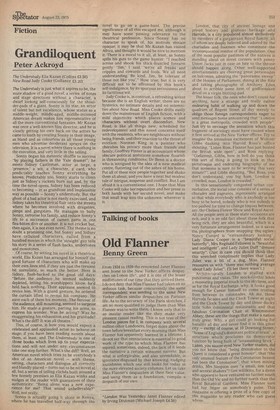Talking of books
Old Flanner
Benny Green
From 1934 to 1939 the renowned Janet Flanner sent home to the New Yorker offices despatches on Lonon life*, and it is one of the lesser misfortunes of our time that they arrived there. 1 do not deny that Miss Flanner had taken on an arduous task, because concurrently the same correspondent was sending to the same New Yorker offices similar despatches on Parisian life. As to the accuracy of the Paris sketches, I am no more qualified to judge them than Miss Flanner was to write them. I know only that to an insular reader like me they make very pleasant casual reading. This is not true of the London pieces for I. in company with several million other Londoners, forget more about the town before breakfast every morning than Miss Flanner has apparently learned in a lifetime. I do not say that omniscience is essential to good work of the type to which Miss Flanner has aspired; sometimes, indeed, the lack of it lends the narrative a certain winsome naivete. But what is unforgivable, and also unreadable, is ignorance disguised by that knowing, nudging loutishness which one still looks for today in the more elevated society columns. Let us take Miss Flanner's despatches at their face value, and using them as a foundation, compile a despatch of our own ... London, that city of ancient lineage and proud history and glorious heritage and Harrods, is a city populated almost exclusively by members of a gargantuan Royal family, all of whom are deeply beloved and adored by the charladies and footmen who constitute the inconsequential residue of the population. One of the most popular pastimes of the natives is standing about on street corners with penny Union Jacks just in case an heir to the throne should happen along. Other well-supported entertainments are cheering great personages on balconies, admiring the "panoramic sweep" of the Houses of Parliament, dining at the Ritz and taking photographs of Anthony Eden about to scribble some item of godforsaken drivel on a virgin blotting-pad.
The lesser folk, the ones who don't count for anything, have a strange and really rather endearing habit of walking up and down the quadrant of Regent Street all day merely to oblige those foreign correspondents eager to send messages home announcing that "London is a great metropolis, crowded with people". Just try to envisage the sensation which this fragment of sociology must have caused when it first arrived at the New Yorker offices. Try to imagine the tremulous excitement of Wolcott Gibbs dashing into Harold Ross's office shouting, "Listen Ross, Flanner has just busted the British wide open", and Ross replying: "Godammit, Gibbs, how in hell do you think this sort of thing is going to look in that picturesque and endearing biography of me that someone is sure to be writing this very minute?", and Gibbs shouting, "But Ross, you don't understand, you big ham. London is crowded, man, London is crowded_" In this sensationally congested urban connurbation, the social year consists of a series of charades and pageants, ingeniously arranged so that while everybody who is anybody is too busy to be bored, nobody who is not nobody is too pushed for time to change toques between, say, the Chelsea Flower Show and Royal Ascot. All the people seen at these state occasions are rich, and it is an odd fact about these folk that being rich, they are also beautiful, which is a very fortunate arrangement indeed, as it saves the. photographers from snapping the, uglies. Nancy Cunard is "extraordinary looking", Lady Diana Cooper is a "beautiful social butterfly", Mrs Reginald Fellowes is "beautiful and intelligent", and Lady Juliet Duff "dresses smartly". (Just in case you should think that this wretched compliment implies that Lady Juliet was a bit of a dog, Miss Flanner reassures us with "there was nothing average about Lady Juliet". I'll bet there wasn't.) Architecturally London is stuffed with panoramas and vistas. The mock-Gothic lends a reassuring imperial touch to the skylines, and as for the Royal Exchange, why, it looks good enough for Caesar himself to come trotting from between its colonnades. Ah me, those Harrods facades and the Clock Tower at night and the Clock Tower by day and those ducky little Soho continental restaurants and that fabulous Coronation Chair at Westminster Abbey, these are the things that make a nation truly great. Why, a girl could go looking for: banality all day and never find it in this great' city — except of course, at 10 Downing Street,' "home of England's dominant political brain", a structure which proclaims its democratic function by being built of "unassuming brick". Listen, you saucer-eyed New Yorker readers, did you not know that "being dressmaker to the Queen is considered a great honour", that "the only unusual feature of the Coronation Season has been the Coronation", that when mixing drinks, Mrs Simpson uses "a small, low table and several shakers"? Gee willikins, for a dame who appears to have ventured no further south than the Old Vic and no further north than the Royal Botanical Gardens, Miss Flanner sure had her finger on somebody's pulse. This. magazine is offering a prize of a free copy of this magazine to any reader who can guess whose.


































 Previous page
Previous page